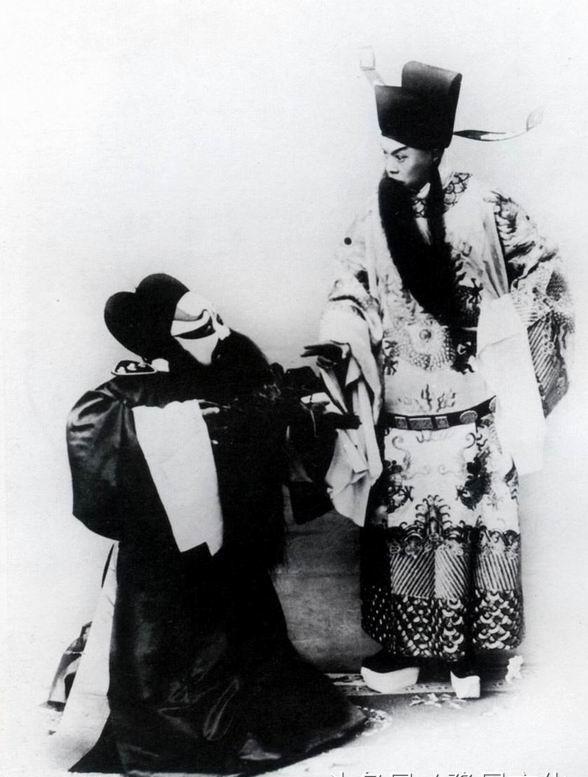Gao Qingkui (1890-1942), formerly known as Zhenshan (Zhenshan), was a zijun. Famous Peking Opera Laosheng performance artist, founder of Peking Opera Gaopai Laosheng Art, one of the "Four Great Susheng" of Peking Opera. Gao Qingkui was originally from Yuci, Shanxi, and was born in Beijing. His father, Gao Sibao (Shi Jie), was a famous clown actor in Peking Opera in the late Qing Dynasty. In the 1930s, Gao Qingkui, Yu Shuyan and Ma Lianliang were known as the "Three Sages" of Lao sheng.

Gao Qingkui's old student sang the Chuzong Tan Sect. After his voice recovered, it was more sweet and crisp, wide and bright, high-pitched and agitated, and rich in timbre. Subsequently, he also absorbed the singing characteristics of Sun Juxian and Liu Hongsheng, and borrowed the singing methods of Lao Dan Gong Yunfu and Flower Face Qiu Guixian, integrated and innovated, forming a unique artistic style, known as "Gao Pai".
Gao Qingkui sat in KeQingxiang and Keban at an early age, learned literature and martial arts from Jia Lichuan and Jia Honglin, and took the stage at the age of 12 to play a doll for Tan Xinpei. Later, he performed with Yang Xiaoduo's "Yiwen Society", Liu Hongsheng's "Tao Yongshe", Tan Xinpei's "Tongqing Society", and Yu Zhenting's "Shuangqing Society". After changing his voice at the age of 18, he practiced martial arts from Li Xinfu. In 1919, Gao Qingkui accompanied Mei Lanfang to Perform in Japan, and starred with Mei Lanfang in plays such as "Imperial Monument Pavilion".
In 1921, Gao Qingkui formed the Qingxing Society by himself, and together with Hao Shouchen and Shen Huaxuan, performed in the Huale Theater, the Zhonghe Theater, the Auspicious Theater, the Star Theater and other theaters. He also rearranged, adapted, and sorted out a number of historical dramas, and arranged the relevant contents into "this play", such as the whole book "Peak Spring and Autumn" (including "Zhan Fancheng", "Wen Zhaoguan", "Assassin Wang Guan"), the whole book "Xiao Yaojin", as well as "Weeping Qin Ting", "Yu Rang Bridge", "Gifting Silk Robes", "Ma Ling Dao", "Shi Kefa", "Drunken Heavy Ears", "Su Qin Zhang Yi", "Stealing Charms to Save Zhao", "Xunyang Lou", "Ying Tianqiu" and other plays. In the 1930s, together with Yu Shuyan and Ma Lianliang, he was known as the "Three Sages" of Xusheng and was listed as one of the "Four Great Susheng".
Gao Qingkui has led the class to perform in Shanghai, Tianjin and other places for many times. In 1933, Gao Qingkui and Mei Lanfang hung a "double-headed card" performance on the Shanghai Tiantou Stage. In May 1934, Gao Qingkui's voice lost its luster until he could not perform normally. In 1938, Gao Qingkui taught at the Chinese Opera College, and later served as a consultant to Fu Liancheng Society. At 5:40 a.m. on February 4, 1942 (the 19th day of the 19th lunar month), Gao Qingkui died in beijing's rotten alley apartment.
Some people think that the "high school" founded by Gao Qingkui is to adjust to the high door, which is a misreading. In addition to the high-pitched excitement of singing art, Gaopai art also lies in the ability to play several roles in different professions such as Wusheng, Hua Face, and Lao Dan. His singing is full of energy, in one breath, especially good at using the atmospheric mouth, with a long cavity dragging board singing method to express the feelings of the characters, in order to seek the artistic effect of vocal affection. His recitation is sonorous and powerful, and the workmanship is profound and meticulous, and he is good at expression. His chanting is mostly in kyoji kyoji. [